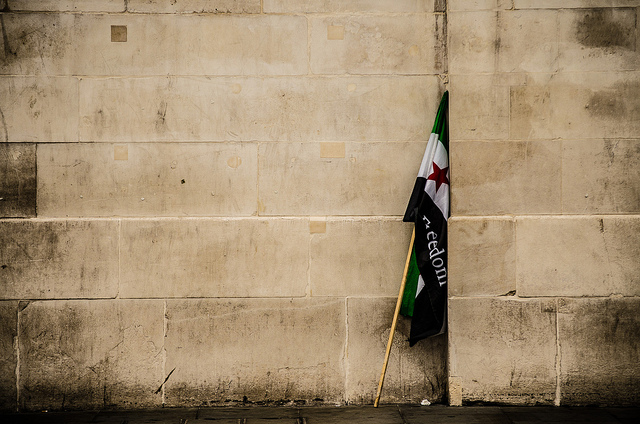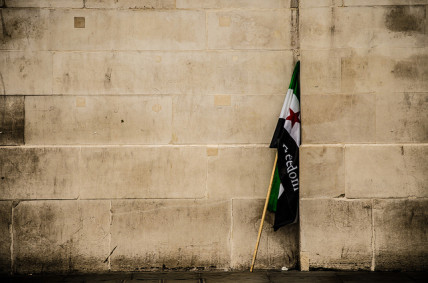
Photograph by Garry Knight
A year after Marie Colvin was killed in Homs, the war in Syria is still raging and has cost the lives of more than 60,000 people. Following new US Secretary of State John Kerry’s first foreign tour, a discussion at the Frontline Club asked if he can deliver on his vow not to leave the Syrian opposition “dangling in the wind”. Who should help the Syrian people and when?
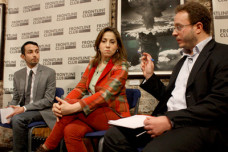
Sakhr Al Makhadhi, Dr Rim Turkmani, and Firas Abi Ali
Julien Barnes-Dacey, policy fellow with the European Council on Foreign Relations, was the first to give his reaction to the news:
“I think it’s insignificant…I don’t think a few 4x4s and bullet proof jackets are really going to make [a difference]. There’s a big jump between that and providing weapons… What’s significant is that they’ve begun a direct conversation with the opposition…It points to a the trajectory of where things are going, that we are drip feeding more and more and eventually you’ll see an escalation.”
Julien Barnes-Dacey on UK contribution announced today: "It's too little too late. They're always 5-6 months behind." #FrontlineClub #Syria
— Sally Ashley–Cound (@AllyAsh) March 6, 2013
On the US Secretary of State John Kerry’s recent tour to the Middle East Sakhr Al-Makhadhi, a journalist who has covered Syria for the past decade said: “[The US is] trying to salvage its reputation and no more… America started this revolution with credit, it had a good reputation; Obama had fans among the Syrian people and there were Syrians who were counting on him… It just went on too long and the Syrians were left dangling for far too long.”
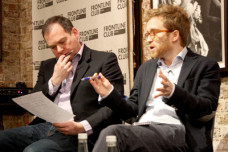
Julien Barnes-Dacey and Paddy O’Connell
“I think it’s insignificant…I don’t think a few 4x4s and bullet proof jackets are really going to make [a difference]. There’s a big jump between that and providing weapons… What’s significant is that they’ve begun a direct conversation with the opposition…It points to a the trajectory of where things are going, that we are drip feeding more and more and eventually you’ll see an escalation.”
Julien Barnes-Dacey on UK contribution announced today: "It's too little too late. They're always 5-6 months behind." #FrontlineClub #Syria
— Sally Ashley–Cound (@AllyAsh) March 6, 2013
On the US Secretary of State John Kerry’s recent tour to the Middle East Sakhr Al-Makhadhi, a journalist who has covered Syria for the past decade said: “[The US is] trying to salvage its reputation and no more… America started this revolution with credit, it had a good reputation; Obama had fans among the Syrian people and there were Syrians who were counting on him… It just went on too long and the Syrians were left dangling for far too long.”
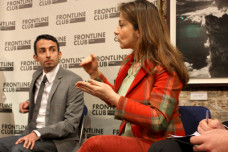
Dr Rim Turkmani
“It is now an international conflict, the root of this conflict started in Syria… social, political, sectarian, deeply history roots, completely justified conflict however right now it has been internationalised there are international interests. If they don’t sort out their matters I don’t see this conflict being resolved.”
Turkmani on how international powers should approach discussions with a problem solving attitude:
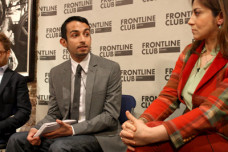
Sakhr Al Makhadhi
“What should the UK and the US do? Pour in humanitarian aid… I don’t support the militarisation of the war, but if you’re going to do it, do it properly. Send in enough weapons to overthrow Bashar al-Assad or don’t do it at all and support political negotiations. Don’t sit on the fence and do neither because that’s just going to prolong the war.”
Firas Abi Ali the Head of Middle East and North Africa Forecasting at Exclusive Analysis failed to see what the international powers would actually talk about in the event of political talks happening to whichTurkmani impressed that they could reach a peaceful reconciliation between the many sides present in Syria and not through a gradual military takeover:
“I don’t want Iran and Russia to support the regime and on the other side the Americans and the UK to support another party… I want support of a solution on the table not somebody around the table.”
Abi Ali added that the regional powers including Qatar, Iran and Saudi Arabia are continually threatened by each other and he feared that the lines between the conflict in the region would soon be incomprehensibly blurred:
“It is a series of localised civil wars rather than Iraq declaring war on Lebanon or something like that…These conflicts are becoming one big conflict.”
Dr Rim Turkmani on the Syrian conflict involving surrounding countries "it's spilling and it's going to spill more and more." #FrontlineClub
— Sally Ashley–Cound (@AllyAsh) March 6, 2013
Firas Abi Ali on the spread of conflict in Syria and its surrounding countries
Al-Makhadhi on how a solution for Syria must come from the west:
You can watch a video of the whole event here:
Written by Sally Ashley-Cound

